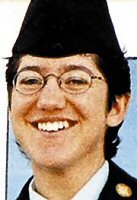US soldier's choice: suicide or torture.

It was 2003 and Alyssa Peterson of Flagstaff, Arizona went to Iraq with the US military. She had a knack for languages and had easily learned Arabic after enlisting in the military in 2001. Her job in Iraq was to conduct interrogations. But she became only the third US woman to die there and the Army said her death was the result of a “non-combat weapons discharge.”
The military claimed that there were many possibilities as to what this meant. Apparently that is what they wanted believed. And if you read various accounts of her sad death you find the same, vague term used. She died from a “non-combat weapons discharge”. And that, the military said, could include “a number of possible scenarios... including Peterson's own weapon discharging, the weapon of another soldier discharging or the accidental shooting of Peterson by an Iraqi civilian.”
Go back for a second and look at the job she was assigned. She learned Arabic and was assigned interrogation of prisoners. Unfortunately the term “interrogation” in Bushspeak has taken on a more ominous meaning: torture.
Consider also Peterson’s own personality. One of her instructors in the military said: “She was a quiet, very intelligent woman who asked a lot of good questions about life and religion.” The same instructor said “She was a very, very good lady who will be missed by a large number of friends. She loved languages and she loved people.” It is said that it was her love for people that sent her to Iraq. Her father said: “Alyssa volunteered to change assignments with someone who did not want to go to Iraq.” One military instructor wrote of meeting Alyssa before she joined the military. She was helping take care of his grandparents. He said, “her kindness will not be forgotten.”
How well would such a person, someone depicted in all accounts I’ve read as kind, take to the task of “interrogating” prisoners? And what about that non-combat discharge of weapons?
Kind, caring and questioning. Could these be the traits of someone conducting “interrogations” in the world of George Bush and Donald Rumsfeld?
One reporter, Kevin Elston, thought something was terribly wrong. He says he made hundreds of phone calls to the military and was given the run around constantly. Finally he put in a Freedom of Information Request. And radio station KNAU, of Flagstaff, reported the results.
“Army specialist Alyssa Peterson was an Arabic speaking interrogator assigned to the prison at the Tal-afar airbase in far north-western Iraq near the Syrian border. According to the Army's investigation into her death, obtained by a KNAU reporter through the Freedom of Information Act, Peterson objected to the interrogation techniques used on prisoners. She refused to participate after only two nights working in the unit known as the cage. Army spokespersons for her unit have refused to describe the interrogation techniques Alyssa objected to. They say all records of those techniques have now been destroyed.”
Peterson “objected to interrogation techniques”. Why? What sort of interrogation are we talking about? The military won’t say. But what sort of techniques would cause someone who was willing to go to Iraq to refuse to perform the duties she volunteered to do? Just two sessions of interrogation were enough to stop Peterson from doing this task. KNAU reported: “Army investigators concluded she shot and killed herself with her service rifle.”
What interrogation techniques would be drive a young, religious woman to use her service rifle to take her own life? What did she see, or was required to do, that made her think that living was no longer worth it? The military won’t say, they claim all “records of those techniques have now been destroyed.” But they know.
Elston says that Alyssa’s colleagues said “she was having a difficult time separating her personal feelings from her professional duties. That was the consistent point in the testimonies, that she objected to the interrogation techniques, without describing what those techniques were.”
Apparently the documents Elston receive refer to a suicide note left behind. But he was not given a copy of it though he has now filed a FOIA request to see the note. What we do know from this note is that it proved the military was engaged in a cover up. How do we know? Remember they said that the weapon’s discharge could have been caused by numerous accidents and that they were investigating. A suicide note would have made that a very short investigation indeed. Surely they already knew what the note said within minutes of discovering the body. They knew what the note said when they informed the parents. They knew what the note said when they informed the press. When they said that that numerous possibilities existed and were being investigated they already knew the cause of death and there is a good chance they knew why she killed herself. Allysa died, they lied, and this was a cover-up.
Would it look good for the US military to say that a translator, the third female soldier to die in Iraq, killed herself because she could not endure the “interrogation techniques” of the US government. They wanted to hide those “interrogation techniques” from the American public and that required them to lie about the death of Alyssa Peterson.
 DiggIt!
DiggIt! Reddit
Reddit Del.icio.us
Del.icio.us

<< Home